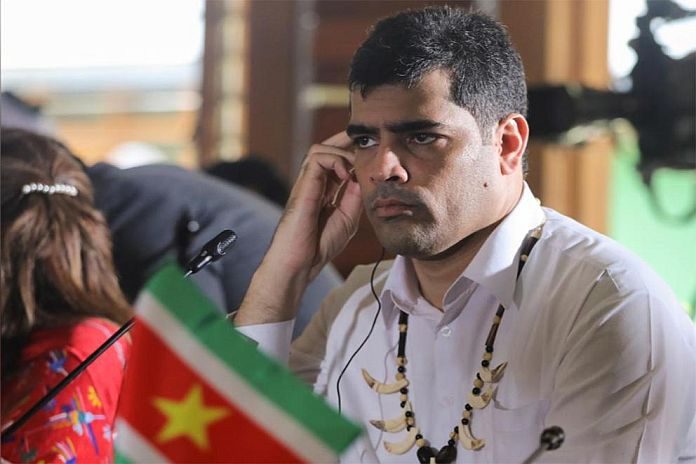By Ray Chickrie
PARAMARIBO, Suriname — Vice President of Suriname, Ashwin Adhin on a private visit to India said the issue of Jammu and Kashmir is an internal affair of India. Adhin, ancestors were among 34,000 Hindustanis sent to Suriname during indentureship, from Uttar Pradesh and Bihar between 1873 and 1916.
Adhin told the media that prime minister Narendra Modi’s abrogation of Article 370 granting autonomy status to Jammu and Kashmir since 1947 was an internal issue and not on the agenda of the United Nations (UN).
The once independent territory of Jammu and Kashmir joined the Indian union after a Pakistan back uprising pushed Maharaja Hari Singh in 1947, after hesitating to join India. Delhi then sent troops. India now has over half a million soldiers, police and other armed forces that have kept Jammu and Kashmir cut off from the outside world.
The UN considered the territory “disputed.” Kashmiries were promised a plebiscite to join India or Pakistan since 1948, but such hasn’t happened. Today the Kashmiris would prefer to be alone and have independence.
Adhin told the media in India that Suriname believes in dialogue and “does not promote interference” in internal affairs of other countries.
In response to a question about Suriname’s views on prime minister Modi’s cancellation of Article 370, the autonomous status that was granted since 1948 when Maharaja Hari Singh joined the Indian Union, he said.
“There is a possibility that the issue could be raised on the margins (of the UNGA).” He added, “Suriname will not raise the issue.” Ashwin Adhim is expected to speak at the opening of the 74UNGA in New York.
The issue of Kashmir is contentious and an emotional one among Hindus and Muslims in Guyana, and Suriname whose ancestors came as indentured servants between 1838 1917 from what is Afghanistan, India, and Pakistan.
Both Guyana and Suriname see the issue as a bilateral one between India and Pakistan and have maintained friendly ties with both South Asian countries.
Suriname and Guyana take India very much into consideration in how their foreign policies are conducted; notable, reliant on Indian aid.
When Guyana and Suriname joined the Organisation of Islamic Cooperation (OIC), it was the Indian base that had to be taken into consideration. Guyana, for example, questioned how India would react to its accession to the OIC.





